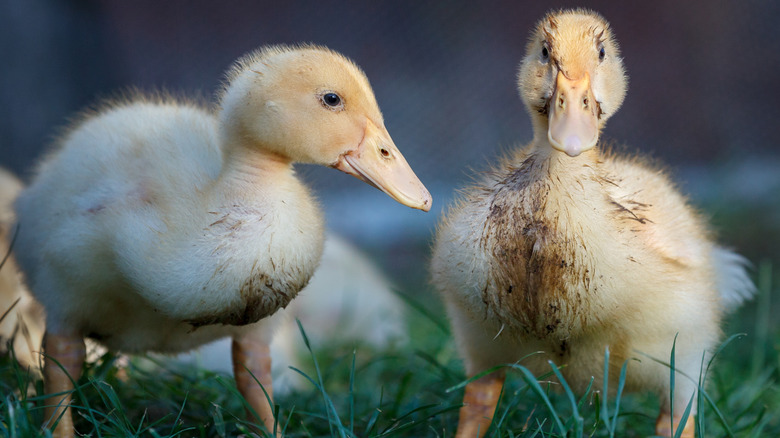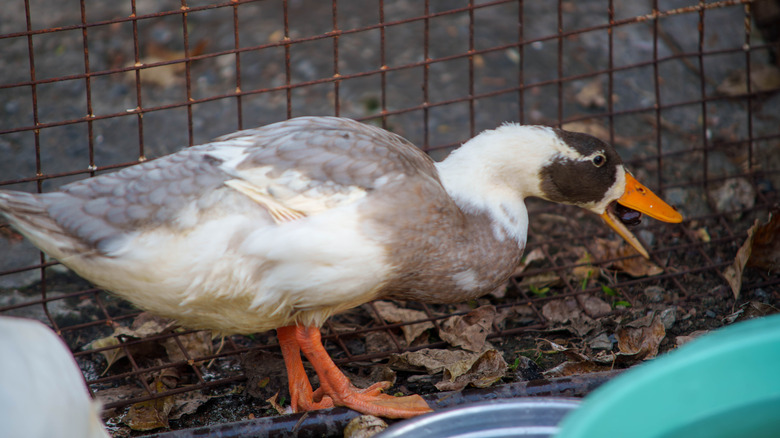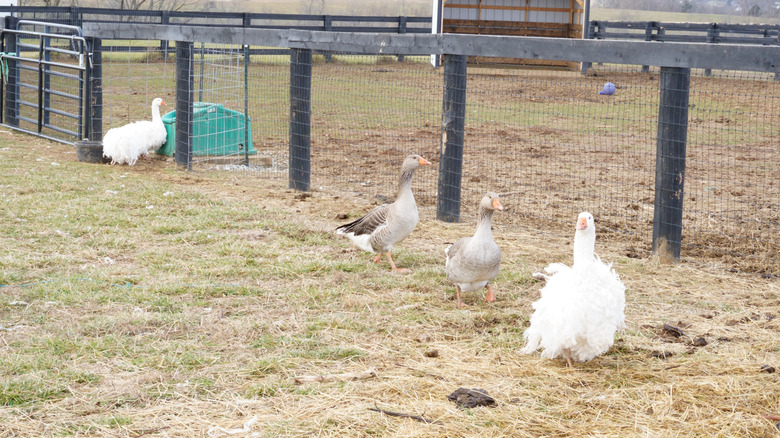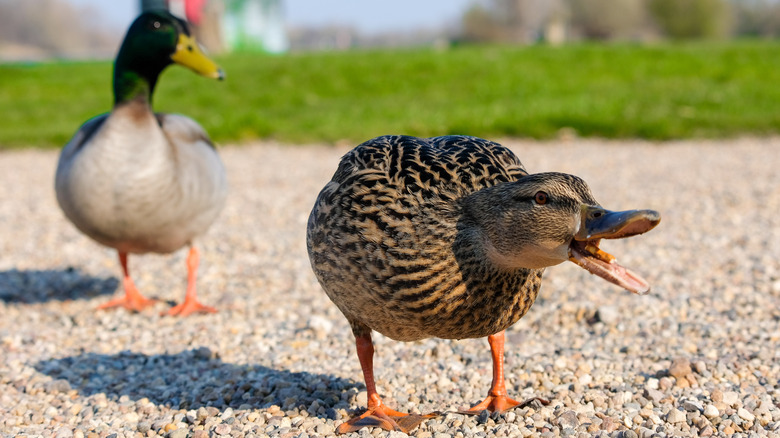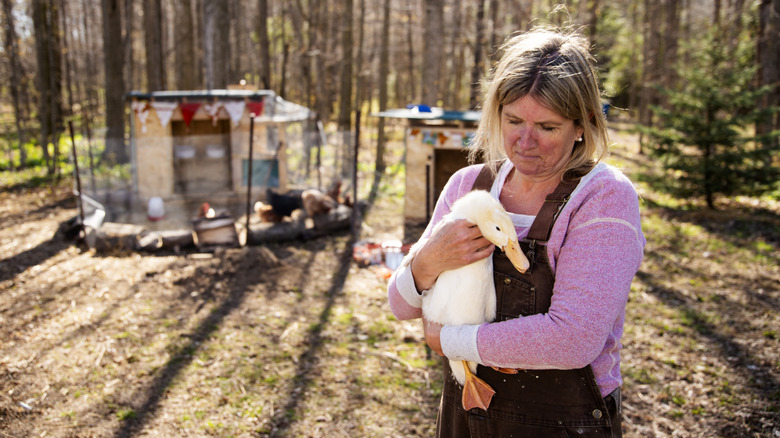Everything To Know Before Adopting A Duck As A Pet
We may receive a commission on purchases made from links.
While a bit unorthodox, ducks can be kept as pets, legally, in most states. Perhaps you've wanted a pet duck ever since you saw Joey and Chandler with one on "Friends," or maybe you just always enjoyed feeding ducks as a child. Ducks can show affection and be entertaining as well. Whatever the reason, ducks can make good companions and offer some of the same benefits that dogs and cats do. However, you should consider the daily activities, requirements, and restrictions associated with adopting a duck as a pet, all of which could pose an inconvenience.
On a positive note, keeping ducks fed is as easy as keeping a more traditional pet fed; you can purchase a bag of duck feed pellets from pet stores and online retailers, such as Mazuri Waterfowl Layer Food for Ducks. Ducks also feed on grass, including weeds, and rid yards of pests, so they can serve as great lawn-maintenance animals.
Some owners consider this type of waterfowl high-maintenance and challenging to care for because of their needs, while others feel the opposite. With this in mind, it's best to consider all variables of ownership before bringing your own personal Donald or Daisy home to be part of your family.
They can be messy
All pets can have bowel accidents in undesired places, but their water bowl is not one of them for most. Ducks, on the other hand, naturally defecate in water, even if it's the same water they bathe in and drink. This means that whatever drinking water you have prepared for them might contain their droppings and need to be replaced regularly. Ducks also enjoy playing in mud and dirty water puddles, so by the end of the day, they could be covered in feces-tainted water and dirt.
It's also important to note that ducks excrete waste frequently — about every 10-30 minutes — which equates to roughly 100 times a day. Since they don't spend all their time in water, you'll find their droppings not just in their water containers but in their enclosure and your yard. The good news is, duck waste makes good fertilizer, due to its nutrient-dense nature. You just need to compost it first before applying it to any plants or soil.
Some ducks can be boisterous
You might find the sounds of ducks quacking at a park or while you're kayaking down a creek harmless and maybe even appreciated. When the quacking happens in your backyard throughout the day, however, you might not feel the same way about it. Your neighbors might also have an issue with this, especially if the quacking wakes them up.
Although all ducks vocalize in some way, some species and breeds are noisier than others. Mallard ducks, particularly the females, quack often to communicate in different ways. One duck owner on the Reddit subreddit r/ducks reported that their female mallard quacked constantly while in her large enclosure, despite being well-fed and having humans interact with her. Female call ducks, as their name implies, are also known to vocalize loudly and frequently.
At the quiet end of the "quack spectrum" are Muscovy ducks. Instead of quacking, this species makes hissing and cooing sounds to communicate. These sounds will likely be too quiet to bother you or your neighbors. You may not even hear them unless you're standing nearby.
They should be kept contained outdoors
Unlike furry indoor pets, ducks should spend most of their time outside in their natural habitat. You can bring them inside on occasion, but they thrive best and should live in an outdoor environment. Living in the great outdoors meets their natural instincts and behaviors that a standard indoor environment can't.
Another reason to keep your pet duck outdoors is their frequent bowel movements and water activities. Ducks love to swim and play in water, and remember, they also poop in water — and poop often. You probably won't want them leaving droppings all over your carpet, so keep them outside instead and ensure they have water in the form of a pond, kiddie pool, or tub to play and bathe in. Have a separate, smaller water source available for drinking that's deep enough for them to fully cover their heads.
It's also recommended to have a fenced-in yard, but more importantly, ducks need a pen with netting or some other type of predator-proof shelter with a roof. When you let them out of their enclosure to play, only do so while you're home and able to keep an eye on them. They should be placed in a roofed shelter when you can't watch them, as well as overnight.
They crave companionship
Ducks can be compared to humans in some ways, including their desire for companionship. They enjoy socializing with other ducks and can get lonely without other feathered friends to quack, swim, and waddle with. With that in mind, it's best to adopt a pair of ducks (or more!) or adopt a second shortly after bringing the first home if a pair isn't immediately available. The ducks can be of the same or different breed or species.
Another option is to complement your pet duck with other birds, such as geese or chickens. All of these birds can generally share the same enclosure without any issues. Certain dogs can also become your duck's sidekicks. However, there are some caveats. Some dogs — especially large ones — see ducks as prey and may want to chase or harm them. This behavior can be avoided by adopting a puppy and duck at the same time, choosing a small dog that weighs under 10 pounds, and/or training. In any case, you should closely monitor all initial interactions between the two animals.
Caring for them is time-consuming
Some pets don't require much beyond food, water, toys, comfortable bedding, the shelter of your home, and waste cleanup. At the end of a typical day, you might end up spending all of two minutes on feeding and cleanup, if necessary. Caring for ducks, on the other hand, requires a lot more time.
One owner on Reddit's r/pets shared their daily routine for caring for their two ducks, totaling 40 minutes every day. They spend 20 minutes in the morning and 20 minutes in the evening. Their daily routine includes filling all water stations and food bowls, relocating the ducks from a garage coop to a yard pen, and cleaning the coop wood shavings in the morning. In the evening, the owner puts fresh wood shavings in the coop, moves the ducks back to the coop, adds fresh food and water, and washes all the water stations.
Other duck owners' daily routines differ. However, if you want your duck to have a clean habitat and to be safe and comfortable every day, you'll need to put effort toward this goal. If you have enough time to devote to a morning and evening routine, or if you have someone to help you, caring for a duck can be manageable, easy, and enjoyable. Otherwise, you might find it too demanding and overwhelming, so be sure to thoroughly consider these daily requirements of ownership, and aim to understand duck behavior before deciding to adopt one.

